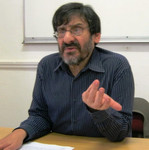
Next year’s election will be about more than the result — it will also test one of the achievements of the past two decades, our ability to hold trouble-free elections.
The warnings are already with us. During the recent Tlokwe by-elections, African National Congress (ANC) supporters and opponents clashed. ANC-supporting students are accused of barring opponents from two universities. Since the campaign has not begun in earnest, this suggests that we may be in for our toughest election yet — a prospect made more likely if we look at election patterns since 1994.
Our elections have been, by general agreement, an accurate test of the people’s will. We have also been largely spared election-time violence. But this second plus may have been possible only because of a reality about which we rarely speak — that our elections have never been competitive. Parties have enjoyed a virtual monopoly over some voters and areas — their opponents usually decided that it was not worth challenging them and so there was little competition for votes.
In our first election, party monopolies were established and protected by force. Independent Electoral Commission (IEC) information analysts identified 165 "no-go areas", where parties excluded rivals (full disclosure: I headed the analysis department). All major parties were victims and perpetrators: ANC activists excluded rivals from townships, but the ANC was barred from much of KwaZulu-Natal and white farms.
There were more than 1,200 allegations of violence and intimidation, confirming how parties kept control of their fiefdoms. This was hardly surprising as the parties’ supporters had been engaged in a mini-war before 1994.
By 1999, the sieges had lifted and it became possible for parties to campaign in their rivals’ strongholds. But mostly they stayed away — or put in token appearances — because there was no point in campaigning. Election results by voting district, which are available from the IEC, show why.
In 1999, the ANC won more than 90% of the black African township vote, the Inkatha Freedom Party (IFP) well more than 90% in rural KwaZulu-Natal. In the suburbs, house owners voted for the Democratic Alliance (DA), or the New National Party, which was on its way out, and their domestic workers voted ANC. It wasn’t worth the effort for parties that did not have a lock over voters in these areas to waste time on them. This continued in the 2004 election, giving us 15 years of electoral peace (at local as well as national elections).
The pattern, in which peace was achieved not because parties tolerated each other but because they didn’t compete, was first tested in 2009. The emergence of the Congress of the People (COPE) meant there was competition in ANC strongholds. The ANC had also weakened the link between traditional leaders and the IFP and was campaigning in areas traditional authorities had made safe for the IFP. It seemed reasonable to fear that the peace would be disturbed by this new competition.
In the main, it wasn’t. The contest in KwaZulu-Natal claimed two lives but was largely contained. The ANC-COPE battle passed off with little more than allegations that posters were torn down or halls denied for no good reason. And so 2009 seemed to be a watershed — a sign that we could maintain electoral peace even in the face of party competition. Recently, optimism was enhanced by the fact that the DA has been campaigning in traditional ANC areas without violent reaction.
But it now seems that this cheerful judgment may have been too hasty. It is not entirely clear why. One possibility is that 2009 did not really change the pattern. First, the ANC-COPE contest was never fierce — a scan of IEC results finds few voting districts where there was a serious battle. In KwaZulu-Natal, traditional leaders may simply have turned over their areas to the
ANC. There may have been no campaigning — just a change in which party held the monopoly.
Now, the contest is seen to be fiercer. Ironically, this may be not be true. While the ANC did face a serious challenge in Tlokwe, popular local independent candidates have no chance in national elections. The challenges from the DA and the Economic Freedom Fighters in the townships may be less significant than they seem. So we may have more of a problem this time because party supporters think the stakes are higher even if they are not.
To avoid alarmism, we need some perspective. There is no sign that we are headed to a return to the 1994 election, in which party canvassers were killed for venturing into opponents’ area. The violence may well get no worse than the bullying we have seen.
But that is no reason for complacency. A key test of democracy is whether we can hold peaceful and fair elections when parties really compete. And so the way in which this election is fought may tell us as much about our politics as the votes the parties receive.
BY STEVEN FRIEDMAN
Friedman is director of the Centre for the Study of Democracy.
Article Source: Business Day
